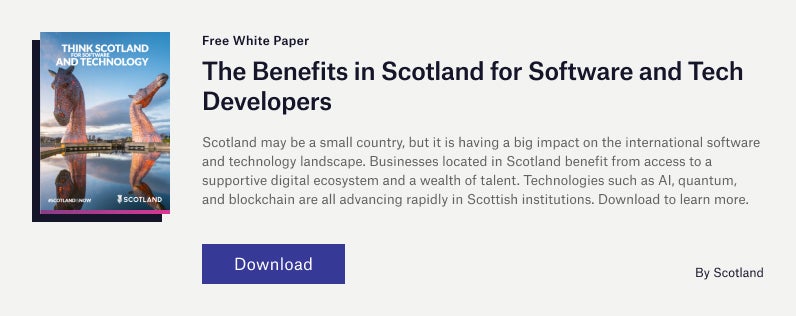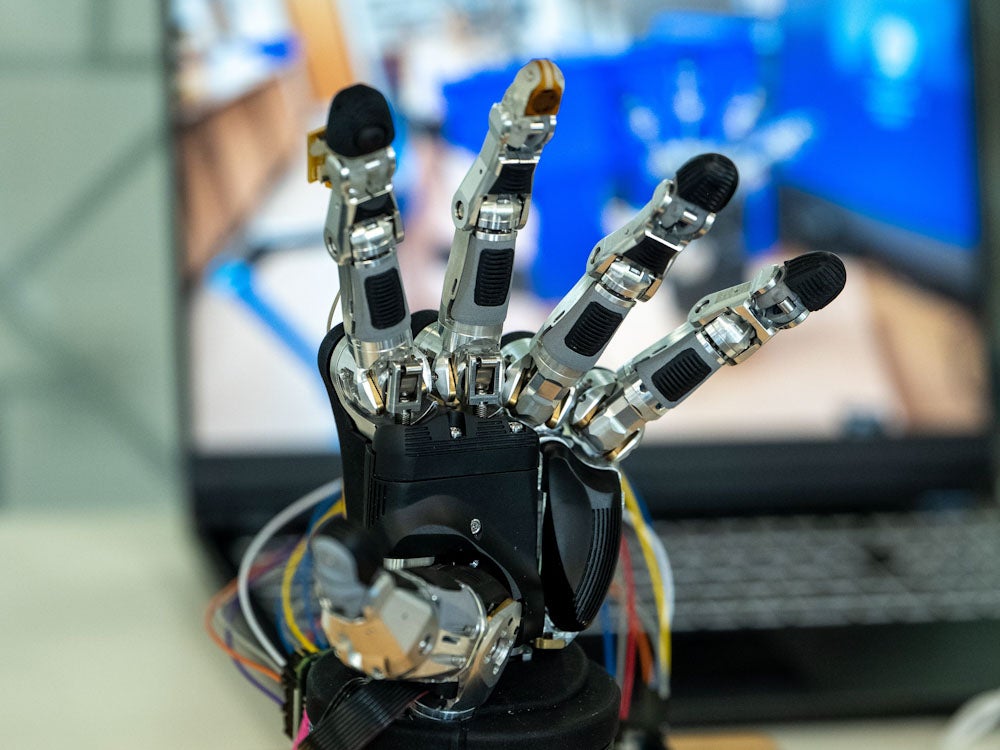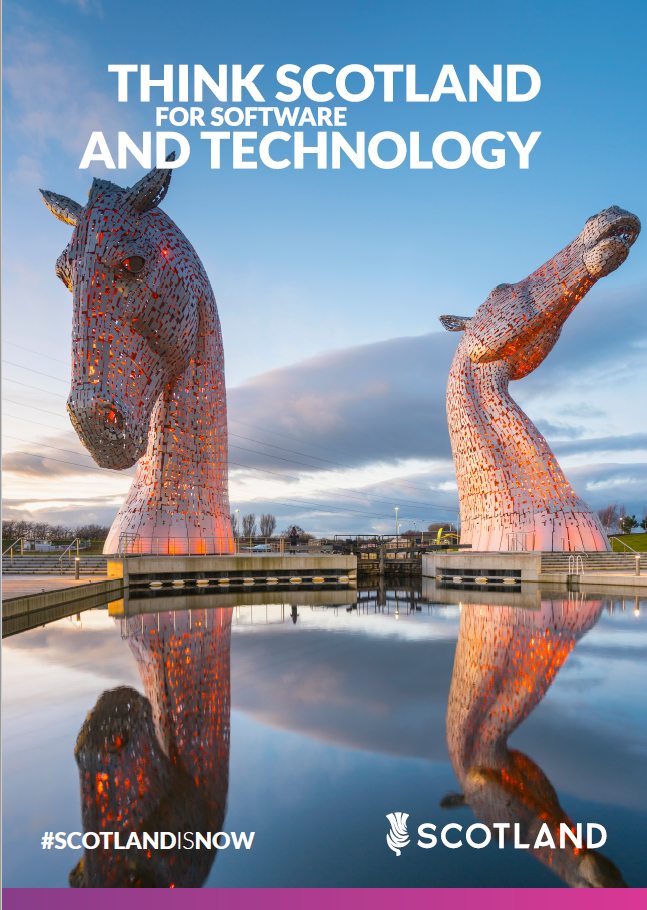
Uses of artificial intelligence (AI) are growing across a range of industries, with a multitude of potentially transformative applications in Scotland – from early-stage detection of cancer to improving energy efficiency in homes.
According to GlobalData, the worldwide AI market is projected to be worth $383.3bn in 2030, up from $81.3bn in 2022. This trajectory represents a compound annual growth rate (CAGR) of 21.4%.

“Although the application of artificial intelligence is much-touted as being industrywide, in terms of foreign investment projects, almost two-thirds (62%) of all AI-related investments are in the ICT and electronics industries,” explains Glenn Barklie, head of FDI services at GlobalData.
“That said, AI projects are on the increase in several industries, such as financial services, creative industries, professional services and transportation. Life sciences and industrials are other notable areas where AI investments are developing.”
In Scotland, AI is vital for the country’s growth plans. A series of initiatives and projects are already increasing productivity and improving the well-being of the population. One example of the Scottish push to embrace AI was the creation of The Data Lab, which is a publicly funded organisation to help the data and AI community grow in Scotland.
Alongside this, the AI Alliance was set up between The Data Lab and the Scottish Government to aid the delivery of Scotland’s AI Strategy and enhance collaboration across the country. The official strategy pays special attention to the ethics of AI to ensure the technology can be trusted, which is especially important given how wide its uses are likely to be.
How AI is enabling medical breakthroughs
In medical diagnostics, AI is enabling significant improvements. An Aberdeen Royal Infirmary patient is now undergoing surgery after a trial into the use of AI alongside mammograms successfully detected early-stage breast cancer. With a nationwide shortage of radiologists, this is a prime example of how AI is making a difference.
“It’s how we use these technologies to help those limited resources make the best use of their time for the patients they’re treating,” says Brian Hills, chief executive officer of The Data Lab.
Further applications of AI for healthcare in Scotland include using the multiple datasets built up across decades for various diseases and medical conditions. For example, AI algorithms are being applied to health data and imaging to check for trends and patterns in patients with conditions such as liver fibrosis, which has a high occurrence in Scotland.
Another project aims to assist with bowel cancer detection. The Clinical Capsule Endoscopy (CCE) involves the patient swallowing a pill containing cameras, which take pictures while passing through the intestines. The process is far less invasive than a traditional colonoscopy and patients can be treated at home to reduce the burden on health services. The AI model that analyses the images was built by data scientists from The Data Lab, which provided funding for the project.

Uses of AI in Scotland’s energy transition
The capabilities of AI are also supporting the energy transition in Scotland. The country has a legally binding commitment to reach net zero by 2045 – five years earlier than almost every other country in the world.
With wind energy central to Scotland’s net-zero ambitions, AI is helping to optimise performance and predict when maintenance will be required at Scotland’s first offshore wind farm, RWE’s Robin Rigg, located off the Solway Coast in Dumfries and Galloway.
Furthermore, AI is assisting with energy efficiency improvements in Scottish homes through a project funded by The Data Lab. IRT is a thermal-imaging company based in Dundee that is partnering with researchers from Robert Gordon University in Aberdeen. They are using thermal-imaging technology in property surveys, with AI identifying areas of heat loss ten times more quickly than normally possible. Once areas of inefficiency have been identified, building upgrades such as cavity wall insulation can be arranged.
Then there are the potential savings in energy and operations costs that AI can deliver when combined with other technologies, such as sensors and IoT devices.
“We’ve saved an SME manufacturer a third of their energy costs simply by putting a sensor on, and by doing basic analytics,” adds Hills. “We saved another manufacturer £1.5m in capital investment by putting a sensor on their machines and showing them their capacity, and what they can optimise.”
The ways AI is solving global challenges
Alongside helping to overcome many of the challenges facing society and businesses in Scotland, applications of AI are addressing issues affecting the planet.
Edinburgh-based start-up Trade in Space uses data from satellites to monitor environmental conditions around the world. When combined with AI modelling software, it allows the company to predict how conditions could change in the future, given different climate scenarios. Support from The Data Lab has enabled the firm to grow and scale up its operations.
Amid the cost-of-living crisis, fintech companies are using AI to assist people and businesses that could be experiencing difficulties. Aveni, which has a base in Edinburgh, uses AI to allow banks to analyse the voices of customers interacting with automated phone lines to determine who might be vulnerable and struggling. Banking services are then customised accordingly to ensure the customer receives extra support. The company recently secured funding of £2.75m to boost further growth, with investors including Scottish Enterprise.
In addition, Inicio AI is a start-up that uses AI to provide debt-support services with a platform based on income and outgoings. With offices in Scotland, the company hopes to remove the awkward stigma some customers may feel when talking about money worries by allowing them to instead interact with an app.
Meanwhile, robots developed by The National Robotarium at Heriot-Watt University in Edinburgh are being trialled in industries that include farming, subsea engineering, and healthcare. Amid a global workforce shortage, a combination of AI and robotics could handle the more intensive or repetitive tasks to save time and resources, leaving people to do the jobs that machines cannot.

Talent and investment in AI
For all its futuristic applications, AI is not a new development in Scotland. This year marks 60 years since the University of Edinburgh began research into computer science and AI, and the university remains integral to AI developments throughout Scotland and internationally. The University of Edinburgh is also where the AI Accelerator Programme is based, offering start-ups and bigger businesses the opportunity to grow their innovations, advance skillsets and take the next step towards commercialising projects.
Throughout the advances in AI around the country, all of Scotland’s 14 universities are continuous drivers of innovation. The institutions are home to projects and departments that are pushing the boundaries of technology, while degrees and courses equip students with the skills they need for successful careers.
“What I’m seeing across our universities now is that every single one has a focus on data, machine learning and AI,” says Hills.
Training is a recurring aspect of the work of The Data Lab. Headquartered in Edinburgh, the organisation seeks to offer courses to people who may be excluded from opportunities in tech. These could include people who studied overseas but may not have their qualifications recognised in the UK, as well as mothers returning to work after having children, or people who may not come from academic backgrounds but still have valuable skills to contribute.
“It’s important that we are investing in upskilling and reskilling people to use these technologies,” says Hills.
This combination of talent, investment, and expertise are some of the main factors that are rapidly positioning Scotland as a leading hub for AI in Europe.
To learn more about Scotland’s AI ecosystem and how you can be part of it, download the document below.


